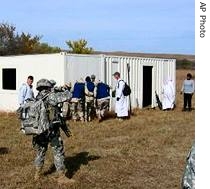2006年VOA标准英语-US Army Intensifies 'Train the Trainers' Progra(在线收听)
By Al Pessin
Kansas
18 December 2006
In the raging debate over the future of U.S. policy toward Iraq, there is one point on which all sides seem to agree - the need for more U.S. troops dedicated to training the Iraqi army and police forces. The U.S. Army already has a program designed to train those trainers at a huge base in the Midwestern state of Kansas. VOA's Al Pessin visited Fort Riley and filed this report.

Army training troops who will serve as advisers to the Iraqis are seen in Fort Riley, Kansas, 28 Oct 2006
The Iraqi villagers are angry. Two of their friends have been detained, and they want them released.
Iraqi soldiers get control of the situation, with the help of their American advisers.
But this is not what it seems to be. All the people involved are American soldiers, some in training, others playing the roles of Iraqi soldiers and civilians. And the village? It is a collection of shipping containers and temporary buildings on a sandy field in middle-America.
One of the U.S. soldiers playing the role of an Iraqi villager is Private Xanthe Smith.
"Our purpose here is, basically, we can get ISF [Iraq Security Force] soldiers trained and ready," said Smith. "That way, they can take care of their own country, without us being there. And, then, we can bring all of our soldiers home."
Smith is helping train other American soldiers, who will go to Iraq to train members of the Iraqi Security Forces, the ISF.
The commander of the "Train the Trainers" operation, Colonel Jeff Ingram, says it is different from most Army training, and requires the soldiers to change their mindset.
"You can always lead from the front. That is what we do," said Ingram. "That is what we have always done. However, here, our focus is not to lead the Iraqi army. It is to get the Iraqi leaders to lead better."
That message appears to be sinking in among trainees like Sergeant First Class Christopher Perkins, a 17-year military veteran.
"As a non-commissioned officer, we have been taught for a long time to take charge, and, if you see a problem, fix it. But, we have to adjust that. You know, it would be better if he does it so-so [more or less adequately], than if an American does it perfectly to standard," noted Perkins.
Sergeant Perkins says this type of training also requires the Americans to bring their own skills to a higher level in exercises like this one, in which the soldiers review how to clear a building.
"If I just teach you a skill, you know it. If I teach you a skill to teach it to someone else, you master it," said Perkins.
And according to Major Larry Nelson, those enhanced skills are important for another reason. Major Nelson is stationed in northern Iraq, where he is one of 11 advisers assigned to an Iraqi army battalion of about 700 soldiers. He visited Fort Riley for two days recently to help with the "Train the Trainers" Program, and he says the American training teams need to be prepared to operate far from other American forces in potentially dangerous situations.
"You have to be able to survive as a team," emphasized Nelson. "You have to build your team first. When you get over there, I mean, that is all you have got."
Major Nelson says this training will give his successors some advantages he did not have when he arrived in Iraq six months ago. One of them is enhanced training in Iraqi culture and language, some of it in a computer lab in one of Fort Riley's hastily-built modular classrooms. On one recent evening, dozens of soldiers were using an Arabic-teaching program, supervised by Sergeant Harris Hatfield.
"This is the Tactical Language and Culture Training System. So, you put on the headset, and you listen to a conversation. And, then, you click on the microphone, and you repeat what you hear. And, the computer will tell you whether or not you got it right or wrong. [Computer]: 'Salaam Aleekum'. [Harris]: 'Salaam Aleekum'. Sounds like you said, 'Salaam Aleekum.' So it gives you feedback once you go into the lesson," explained Hatfield.
Efforts to increase the number and quality of American military training teams in Iraq, and also for Afghanistan, are moving faster than Ft. Riley can train those trainers. Many U.S. units are taking troops off the front lines, and sending them to live and work full time with Iraqi units.
Lieutenant Colonel Lou Long, who commands 43 American trainers in northern Iraq, says more teams are needed, and they need to be larger.
"I think it is very important to increase the size of them," ssaid Long. "We have talked about that a lot. We figured it needs to be somewhere between 24 and 30 people on a team."
But, Colonel Long says, not all members of the team need to be trained as trainers. He says, if the teams have their own security and logistics capability, the specially-trained trainers can spend more time working with their Iraqi counterparts. He and other officers say, the more that happens, the more quickly the Iraqi will units improve, and the more quickly they will not need so many U.S. and coalition combat troops in the country.